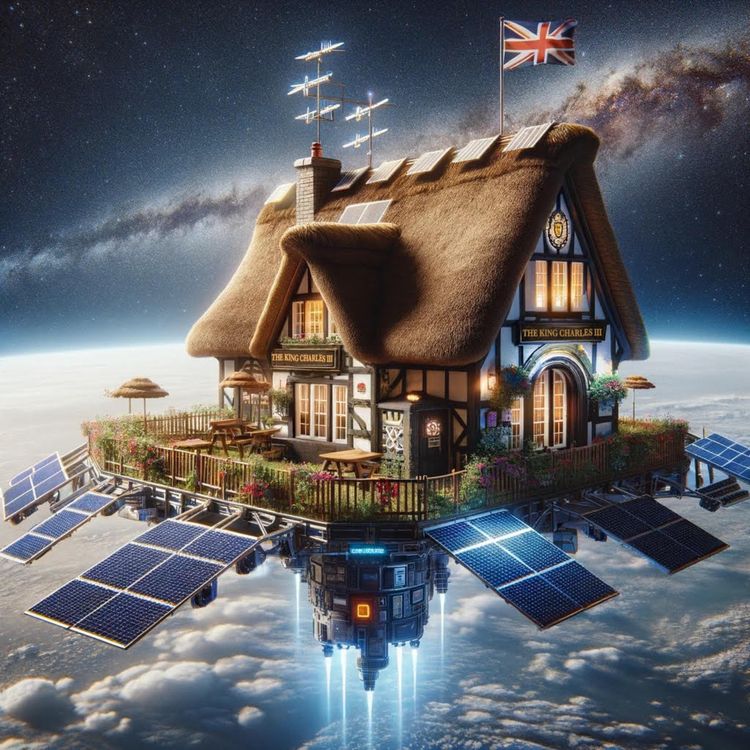Share

Anglofuturism
Hobbiton, Numenor and the riddle of architectual aesthetics
Season 1, Ep. 3
•
It's widely felt that the British buildings and townscapes have, since the Second World War, become uglier and of lower quality.
From their tasteful half-timbered space station, Tom and Calum ask Samuel Hughes, an academic and aestheticist, about the causes of those complaints. We discuss the inherent characteristics of architectural beauty, the divergence of taste between architecture students and the rest of us, and the future of the British built environment. Are natural materials making a comeback? What about robotically-crafted ornament? And with what level of ferocity should we crush the Nimbys?
We also prevail on Samuel to tell us what Britain can learn from arresting built enviroments of fiction.
More episodes
View all episodes

4. Sort out the Boriswave, embrace automation
01:26:41||Season 2, Ep. 4Tom and Calum welcome Tom Jones to the KCIII. Jones is a councillor and essayist, and here emphasises the need for a radical reprioritisation of state spending, focusing on infrastructure and automation. He discusses the Boriswave, noting it has lowered living standards, and will cost taxpayers tens (or hundreds) of billions. Jones advocates for selective immigration, raising the salary threshold to £40,000, and promoting automation to boost productivity. He proposes a Royal Robotics Society and annual awards to elevate the status of robotics, aiming for a Britain capable of global influence.Jones' ASI paper: https://www.adamsmith.org/research/selecting-the-best-building-a-future-focused-immigration-systemJones' Substack: https://www.potemkinvillageidiot.com/Jones' X profile: https://x.com/93vintagejonesAnd a correction: on 44:30, Jones says dependents are mostly economically inactive. He clarifies that it's a significant portion, but not more than half.
3. The last hope for the Chagos Islands: Calum Drysdale
01:04:43||Season 2, Ep. 3The government is attempting to seal its giveaway of the Chagos Islands: a crucial archipelago in the Indian Ocean that was uninhabited when the Portuguese found them, but to which Mauritius – thousands of miles away – has made a specious claim. Extraordinarily, the British government is trying to indulge that claim – and to pay billions to continue to use the island that hosts a military base.The public has still not been given a satisfactory explanation for the giveaway, but the prime minister and the attorney general are thought to be of the view that Britain should obey a non-binding judgment by a partisan international court. That court is stacked with enemies of Britain... but the wallet inspector must be obeyed!Starmer and co are inches away from sealing the giveaway. But they reckoned without a ruddy young Anglofurist...Our very own Calum Drysdale!Calum and Lord Kempsell are together launching a judicial review into the putative giveaway. As news breaks of the judicial review, Tom and Calum discuss:The history of the Chagos IslandsThe bizarre logic of the governmentBritain's slender hopes of keeping the islandsHMG now has 14 days to respond to Calum and Lord Kempsell.Co-presenters: Tom Ough and Calum DrysdaleProducer: Æron Laffere
2. Britain's manifest Antarctic destiny
01:04:38||Season 2, Ep. 2In 1768, Captain Cook set sail with secret instructions: to find the last unknown continent, theorised to lie at the globe's most southern extreme.More than 250 years later, that continent remains protected by an international treaty. Britain's slice is about eight times as big as Britain itself – and its exposed rock makes it the best part of Antarctica for mining. The British Antarctica Territory (BAT), in short, could make Britain fabulously wealthy. The treaty is up for discussion in 2048. But other countries want that slice...Tom and Calum discuss the BAT's history, current state, and future – a Anglofuturist's dream.Tom's Telegraph article on the topic: https://www.telegraph.co.uk/news/2025/01/23/the-antarctic-oil-bonanza-that-could-save-britain/
1. First we came for the dogs – now the Nimbys and criminals
01:06:32||Season 2, Ep. 1The thatch has been combed... the pint glasses are squeaky-clean... and the Anglofuturism podcast is back! Tom and Calum are once again broadcasting from the King Charles III orbital thatched pub. Today we welcome Lawrence Newport, darling of the British progress movement and bane of vicious dogs.Lawrence got the government to ban the XL bully – a savage breed of dog with a horrific record of violence. Having dispatched the dogs, he is now coming for the Nimbys and the criminals via two new campaigns: Looking for Growth and Crush Crime. Lawrence and his colleagues are, in our view, some of the country's most important practitioners of practical Anglofuturism.Lawrence, Tom and Calum talk about the most effective ways to bring down crime, whack up infrastructure, and force the government to do things it doesn't want to do. We also hear the inside story of the XL bully campaign.LFG: https://lookingforgrowth.uk/Crush Crime: https://crushcrime.org/Audio editing by Calum Drysdale and Aeron Laffere.
8. Make Britain the compute capital of the world!
01:28:05||Season 1, Ep. 8In this series finale, Calum and Tom welcome Samo Burja to the King Charles III Space Station. Samo is an analyst whose highly-regarded San Francisco-based consultancy views history as being shaped by 'live players'. When was Britain last a live player? What kind of activity would be required to wrench us off our course towards oblivion?Samo also discussed his plan for making Britain the wealthiest country in the world: seek energy abundance, prospect Antarctica, and become the compute capital of the world. Oh, and spend the entire NHS budget on drug discovery. Read Bismarck Brief here:https://brief.bismarckanalysis.com/And read Palladium, the magazine Samo runs here: https://www.palladiummag.com/
7. Bring back the captains of industry!
01:00:32||Season 1, Ep. 7Rarely is it argued that there are not enough fat cats in British industry. But Rian Chad Whitton, an industrial policy specialist at Bismarck, argues that we are not doing enough to support big players. As it stands, Britain has a puny industrial base that is ill-suited for manufacturing at scale, developing 21st-century robotics, and providing the materials we need to defend our shores.Rian has a plan, though – involving nuclear energy, captains of industry, and Welsh gold.Read Rian's work at riancwhitton.substack.com
6. How the Earth's superheated innards can transform Britain (and the world)
59:26||Season 1, Ep. 6You are currently directly above an energy source that is clean, available all day long, and – at least at our current Kardashev level – all but limitless. Naturally, the British government has approximately zero interest in it. But they will soon, because transformational geothermal energy is getting closer.The main obstacle, currently, is the difficulty of harnessing the extreme heat that one finds several miles below the Earth's surface. It melts electronics and resists the creation of pipework, meaning that it's very difficult to sustainably pump fluid in and out.Our latest guest is John Clegg, a technologist and geothermal expert who is making progress in developing high-heat electronics. John joins us in our orbital space pub to tell us about the new frontiers in geothermal, the best way of making it work for Britain, and the most mind-boggling engineering feat in the history of Dorset.Learn more about Hephae Energy Technology, of which John is CTO, via their website, or subscribe to their monthly newsletter here.https://www.linkedin.com/newsletters/hephae-energy-technology-7076836521588207616/https://www.hephaeet.com/
5. A million artificial wombs!
01:14:18||Season 1, Ep. 5Britain's birthrate is far below replacement rate. What does this mean for our future? Why has it happened? Via which apparently nutty ideas can we reverse the situation? And why was our guest trying to rack up "micro-marriages"?Aria Babu, think-tanker and pro-natalist, joins us in the King Charles III Space Station. Aria is a champion of artificial wombs and a sharp thinker on everything relating to fertility – including the love life of Taylor Swift.Aria's Substack: https://www.ariababu.co.uk/Aria's X profile: https://twitter.com/Aria_Babu
4. The land that stopped building
01:29:26||Season 1, Ep. 4The Victorians carpeted Britain in rail, went on majestic sprees of housebuilding, pioneered underground rail and coal power stations, and built magnificent subterranean sewerage. Their ancestors cancelled most of HS2, haven't built a reservoir for thirty years, lets Nimbyism run amok, and can't even electrify all our trains, let alone swap them for maglev.How can we redress this generational embarrassment? Sam Dumitriu, of the think-tank Britain Remade, believes it's possible to revive the Victorian spirit and turn Britain back into a nation of doers. He joins us in the King Charles III Space Station to discuss his ideas.Grab your trowels – we're going building.